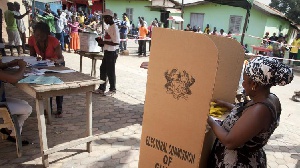 Ghanaians hope for free, fair and peaceful elections
Ghanaians hope for free, fair and peaceful elections
Ghana's youth population is exploding and the upcoming elections provide a window of opportunity for them.
Digital technology is enabling them to access, share and create information at a lower cost, greater speed and scale than ever before.
If citizens harness this power effectively, they can monitor and track election results and irregularities, make informed choices and mobilise young people to vote and vet their leaders.
Fun campaigns using hashtags #iRegistered and "Our Vote, Our Voice" - #OVOV are encouraging young Ghanaians to register and vote.
On average 66% of citizens in Ghana have voted in elections since independence and it's hoped that these technologies can help increase this figure. Citizens can also check their registration details by SMS using a shortcode established by Ghana's Electoral Commission.
Activists suing MPs
Meanwhile, Odekro, a parliamentary monitoring site in Ghana helps citizens scrutinize parliamentary proceedings and their elected representatives by enabling them to access information on their MPs and publish parliamentary debates word for word.
Nehemiah Attigah, Odekro's principal lead is excited by technology's potentially transformative role. "Technology -- primarily social media platforms -- are enabling Ghanaians to fact check claims, consume news, participate in the electoral process and feel engaged in political party campaigns. Young Ghanaians are also encouraged to register and vote," says Attigah.
MPs can no longer rest on their laurels. Last year, Odekro created a storm by sharing infographics on social media which highlighted MP's absenting beyond the limit that Ghana's Constitution allows. It revealed that almost 50% of MPs representing the two main parties are breaking the law.
They've seen how easily elections discourse can disintegrate into insults and frivolities, which risks inciting violence."
Evans Paul Aidoo was highlighted as the worst offender, missing an astounding 188 sittings. Odekro is now suing 21 MPs for absenteeism, sending the message out loud and clear to parliamentarians, we the people are watching you.
IAmAware Ghana, a web-based platform developed by think tank CDD-Ghana is taking things one step further by enabling people to visualize public data on services and demand better. Citizens can find localised information on exam pass rates, textbook availability, infant mortality rates and disease incidence in their district and region. They've also created a district league table to rank performance across districts.
Bloggers demand no 'politricks'
Bloggers in Ghana are also gathering forces. BloggingGhana, a networking community for bloggers, has created a website - Ghana Decides which collates news on elections.
Citizens can access live interviews with MPs, participate in polls, find out about disqualified candidates and view infographics to quickly visualize manifesto highlights, issues relevant to youth and voter registration procedures.
These nuggets of information are being rapidly distributed across social media platforms like Twitter and Facebook, sparking informed debate among citizens.
Jemila Abdulai, their social media lead explains why this is so critical.
"Traditional media in Ghana has a reputation for being politicized, particularly during elections. That's why social media initiatives like Ghana Decides are important.
"They offer a good balance for Ghanaians at home and abroad: non-partisan, factual, and issue based information, with none of the 'politricks'."
Tracking oil spend, via an app
Penplusbytes, a civic tech organization, has developed several platforms and an app that supports free and fair elections. They are fact-checking political campaigns and collating data from social media and SMS reports to track election irregularities, fraud and outbreaks of violence.
They plan to share this information in real time with the Electoral Commission and the National Elections Security Task Force, enabling more rapid response when it's needed most.
They're also creating short videos which can be easily shared on social media and WhatsApp to encourage youths to vote.
They've seen how easily elections discourse can disintegrate into insults and frivolities, which risks inciting violence. They're combating this through data journalism and generating content which promotes issues based discussion.
Their web platform and Android app, Know Your Budget enables citizens to scrutinize the budget, allowing them to see petroleum receipts and allocations by region and sector.
With all this information at our fingertips, we could easily be lulled into a false sense of security, viewing technology as a panacea to all social problems. If only things were so simple.
Just 30% of Ghana's population are online, with only 13% subscribing to Facebook. Fewer still truly believe their concerns are being acknowledged and addressed. There are also huge gaps in the data available for citizens to scrutinise their leaders. Even when this information is available, few are adequately skilled to use it well.
We can start tackling the digital divide through intermediaries like journalists and civic groups, which can help bring some of this critical information offline through national and regional public dialogues.
The wide reach of radio stations must be harnessed. Cultural change is also needed, to make government accountability the norm.
Nonetheless, this digital age is an exciting one, giving hope to citizens across the continent that their voices can and will be heard, empowering nations to shape their own future and keep their leaders in check.